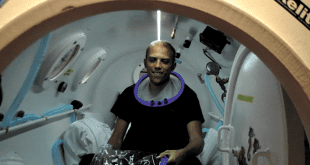By Martin Maldonado, MD, FACG
 The current guidelines for colonoscopy are recommended for anyone over 45 to get screened. Early colonoscopy prevents cases of colon cancer in those over the age of 45 due to education and efforts to remove polyps early on before they can proliferate and turn cancerous.
The current guidelines for colonoscopy are recommended for anyone over 45 to get screened. Early colonoscopy prevents cases of colon cancer in those over the age of 45 due to education and efforts to remove polyps early on before they can proliferate and turn cancerous.
While the number of colon cancer diagnoses in older adults is on a downward trend, the conundrum is that people born in the ’90s and later are experiencing higher numbers of colon cancer. If they wait until the recommended age of 45 to get screened, the polyps may turn cancerous and progress to later stages of cancer diagnosis, which are more challenging to treat.
Why are younger people getting colon cancer?
A study led by the American Cancer Society (ACS)1 compared the lowest risk of colon cancer diagnosis (people born in the 1950s) to the increasing rates of colon cancer in young and middle-aged adults in the United States, those born in the 1990s.1 Individuals born in the ‘90s have double the risk of colon cancer and quadruple the risk of rectal cancer.1
The thoughts on why this is occurring in the younger generation are dietary choices, such as saturated unhealthy fats, processed foods, chemicals and additives, and more sedentary lifestyles and unhealthy habits. These thoughts on causes can also be attributed to other generations and people with unhealthy lifestyle habits. Getting a colonoscopy saves lives by removing polyps early or diagnosing a patient as high risk if the polyps are large or if the patient has multiple polyps. The problem is younger people are unaware of their risk and often ignore any warning indicators.
Symptoms of Colon Cancer
There are often no symptoms initially, making it challenging to screen patients and catch early stages of the disorder; however, there are many symptoms that are often mistaken for issues such as hemorrhoids, IBS, colitis, and other GI conditions.
Some of the symptoms of colon cancer include the following:
• Anal bleeding
• Blood in stool
• Abdominal and intestinal pain
• Mucous
• Stool that resembles coffee grinds
• Bouts of constipation and diarrhea
Genetic risk factors can also attribute to colon cancer risks, such as Lynch Syndrome or breast and uterine cancer, but they typically only account for 10% to 20% of cases.
Microbiome issues may be a significant risk factor.
Proteins, microbiota, and microorganisms are responsible for the mucosal and epithelial damage or leaks within the gut. The natural functioning of our intestinal wall is to allow nutrients to pass through, but when there is a microbiome imbalance, large openings enable damaging substances to enter the bloodstream. This happens when tight junctions in the intestinal wall open and cause leakage. Microbiome imbalance can lead to numerous health conditions, including gastrointestinal issues. Adding foods containing probiotics, prebiotics, and omega 3-fatty acids can help to restore a healthy microbiome.
Limiting your Risk of Colon Cancer:
• Dietary changes (eat more plant-based, whole foods and limit processed foods, meat, and saturated fat)
• Maintain a healthy weight
• Exercise regularly
• Don’t use tobacco products
• Reduce alcohol consumption
• Eat more probiotic and prebiotic foods (asparagus, artichokes, garlic, onions, and fermented foods)
• Supplement with Omega 3-fatty acids
No matter your age, if you have any GI symptoms, don’t ignore them. Make an appointment with your healthcare provider and ask for a referral to a gastroenterologist. Getting to the root cause of your issues early on is critical for optimal outcomes.
Dr. Martin Maldonado, a board-certified gastroenterologist, explains the causes and symptoms of colon cancer symptoms, diagnoses, and treatment options to help patients find relief.
Schedule an Appointment with Colorectal Expert Today
If you are struggling to manage your gastrointestinal symptoms, a gastroenterologist can help you find relief. Schedule an appointment with Dr. Martin Maldonado at our Florida Medical Clinic location in North Tampa.
About Martin Maldonado, MD, FACG
Dr. Martin Maldonado , a board-certified gastroenterologist, specializes in Gastroesophageal Reflux Disease (GERD), diseases of the esophagus, stomach, small intestine, colorectal cancer screening, Inflammatory Bowel Disease (IBD), Weight Loss and nutrition.
Schedule your appointment today:
Florida Medical Clinic
(813) 280-7100
14547 Bruce B Downs Blvd, Suit A, Tampa, FL 33613
References:
1.. R Siegel, Colorectal Cancer Incidence Patterns in the United States, 1974‚
—2013, JNCI: Journal of the National Cancer Institute, Volume 109, Issue 8,
August 2017, djw322, https://doi.org/10.1093/jnci/djw322,
https://academic.oup.com/jnci/article/109/8/djw322/3053481?login=false
 Central Florida Health and Wellness Magazine Health and Wellness Articles of the Villages
Central Florida Health and Wellness Magazine Health and Wellness Articles of the Villages


